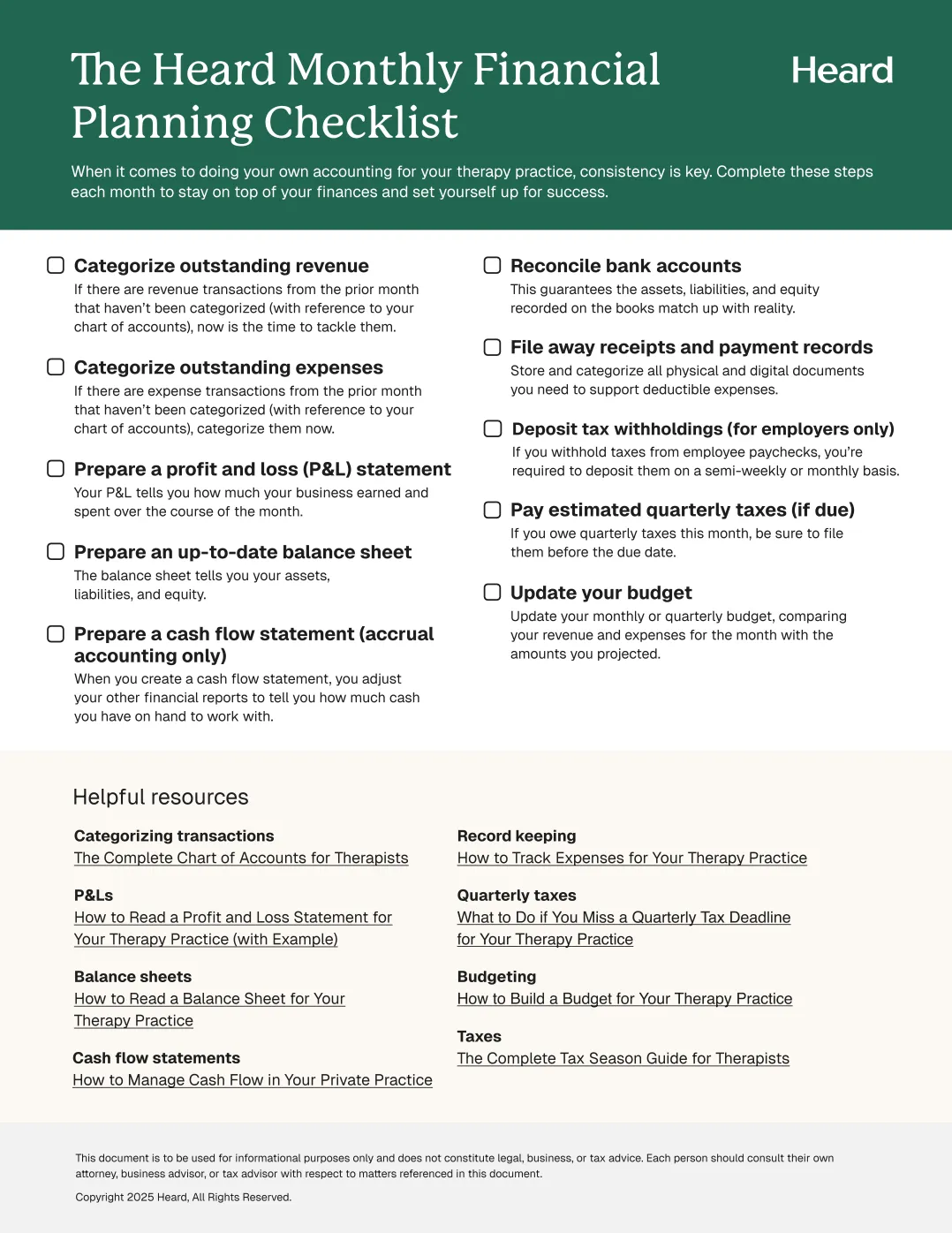As a private practice therapist, your job is not only to provide effective mental health services to your clients, but also to function as an entrepreneur who runs and takes care of all aspects of your own business.
This can range from management of operations, marketing, and human resources all the way to the dreaded accounting and taxes.
{{resource}}
Common financial struggles for therapists
For many mental health professionals running their own private practice, finances can play a challenging role in building and growing your business.
Whether that’s poring over tax deductions, allocating your funds for quarterly estimated taxes, or simply the inability to keep your finances organized and up to date due to your busy session schedule, these stressors can add up and impact your own mental health, along with the health of your business.
Here are three of the most common financial problem areas that therapists and clinicians typically struggle with.
Confusion around tax deductions
The mere thought of tax season can be overwhelming. On top of a potentially full caseload of clients and a growing list of expenses, you also need to figure out how to file your taxes.
An important part of this is finding out how to save money in the process! This can cause a lot of questions: As a therapist, am I eligible for tax deductions? What are common tax deductions I should utilize as a clinician? How much is my tax liability this year?
Solution: A great starting point around tax deductions is to do your research. On the Heard blog, we break down common tax deductions for therapists based on expenses we typically see practice owners use.
Another way to combat anxiety around tax deductions is to employ a professional to help you! Our bookkeepers work directly with you to classify and categorize your expenses so that by the end of the fiscal year, you have a clear picture of what you are spending on which kinds of items. We are also able to assist you with filing your tax returns and identifying whether to take the standard or itemized deductions.
Quarterly estimated taxes
The IRS requires that you pay quarterly estimated taxes if you expect to own at least $1,000 in federal taxes over the course of the year.
This can cause some concern among mental health practitioners in private practice. After all, as a clinician, monthly revenue streams can fluctuate, and paying out of pocket on a quarterly basis can require some advance planning. Managing your finances is a tough task because, in addition to large amounts of federal tax that you may owe, there are a variety of other overhead expenses that will need to be allocated in order to keep the wheels of your business turning.
Solution: The best step to take in regards to curbing anxiety around quarterly taxes and avoiding fees or penalties is to start wherever you can with calculating your estimates and setting aside savings.
The IRS offers tips for how to calculate your quarterly taxes. At Heard, we also help you to calculate your taxes on a quarterly basis. You can learn more about paying your quarterly taxes here. We also recently launched a new feature entitled “Financial Allocation Guide”, which functions as a tool to help our users to prepare, plan and allocate funds into categories such as taxes, operational costs, retirement contributions, and more.
In addition to this, our Heard bookkeeping team works closely with you to keep track of how much in revenue you are making and how much of your budget is going towards expenses. This way, you will have a clearer picture of your monthly revenue and how much cash you have generated.
Keeping practice finances organized
As a business owner, you are responsible for keeping records of all receipts, invoices, financial documents, and tax documents. The list goes on, and it can all be difficult to keep up with. Discomfort over money matters are completely understandable; this isn’t something that you were taught in your graduate program.
Solution: The most important thing is for you to stay disciplined with your finances. This means tracking your expenses, either through an online software or a spreadsheet that you are operating yourself. Always be sure to store important documents in an accessible, easy to navigate place, such as Google Drive.
It's also important to keep your business finances separate from your personal finances in order to better track your practice's cash flow, protect your practice from an audit, and properly calculate your tax deductions.
Heard can also help give you a quick snapshot of your financial health. Our accounting software allows you to view your finances at the end of every month, track your monthly profit and loss, and view your categorized income and expenses, all within our platform.
All in all, there is much frustration that can come with organizing your practice and its finances. Managing and running the bookkeeping and tax side of things is still a learning process for any business owner, and it is important that you take one step at a time. Heard is here to help and answer any questions you may have during the process of growing and running your business.
—
This post is to be used for informational purposes only and does not constitute legal, business, or tax advice. Each person should consult their own attorney, business advisor, or tax advisor with respect to matters referenced in this post.
{{cta}}
Manage your bookkeeping, taxes, and payroll—all in one place.

Discover more. Get our newsletter.
Get free articles, guides, and tools developed by our experts to help you understand and manage your private practice finances.





